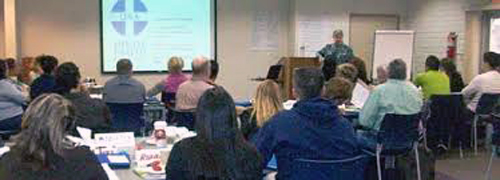
ST. LOUIS, Missouri (Press Release) — Synagogues nationwide are turning to an innovative training program to equip their congregations with the skills to recognize mental illness and respond to mental health emergencies. The program, Mental Health First Aid, helps people assess a mental health crisis, select interventions and provide initial help.
“The faith community has always felt a calling to help people, but has not always had the tools to assist people struggling with conditions like depression,” says Lesley Levin, a Para Rabbi and president of Behavioral Health Response in St. Louis. “Shortly after our first training, we realized that this was a resource the faith community had been missing.”
Rabbi Levin says Mental Health First Aid gives compassionate people the practical skills to complement their spiritual gifts.
“Many times people of faith respond to someone with mental illness by saying ‘I’m praying about it,’ but now they can do something about it,’’ says Rabbi Levin. “I compare it to seeing a child get hit by a car. You pray, but you also call 911.”
While the program has been offered to a wide spectrum of people in the faith community, some instructors see the training as particularly beneficial to clergy.
“Pastors know how to work with couples to save a marriage or deal with issues of faith, but they usually get very little training about mental health problems,” says Rita McElhany, a certified instructor and mental health promotions coordinator at Missouri Department of Mental Health, which disseminates the program along with the National Council for Behavioral Healthcare and the Maryland Department of Health and Mental Hygiene.
“Many clergy have already experienced people coming to them for these kinds of problems,” says Helen Siporin, a certified instructor and president of Mental Health America of the Central Valley in Fresno, CA. “The training helps them recognize the warning signs of mental illness before the congregants even come to them for help.”
Mental Health First Aid is an evidence-based program, which uses role-playing and simulations to demonstrate how to assess a mental health crisis, select interventions and provide initial help. The training also addresses the risk factors and warning signs of specific illnesses like anxiety, depression, schizophrenia, bipolar disorder and substance use disorders.
Mental health problems are common: one in five people worldwide will suffer from depression, anxiety attacks, bipolar disorder and other diagnosable mental health problems at some point in their lives.
The new program, Mental Health First Aid teaches a 5-step Action Plan:
1) Assess the person’s situation for risk of suicide or harm
2) Listen non-judgmentally to the person
3) Give the person reassurance and information
4) Encourage the person to seek professional help
5) Encourage the person to seek self-help
“People may know CPR or the Heimlich Maneuver, but the truth is they are more likely to come across someone in an emotional crisis than someone having a heart attack,” says Bryan Gibb, director of public education at the National Council for Behavioral Health. “Mental Health First Aid emphasizes that mental illnesses are real, common and treatable, and that help is available.”
*
Preceding provided by Mental Health First Aid